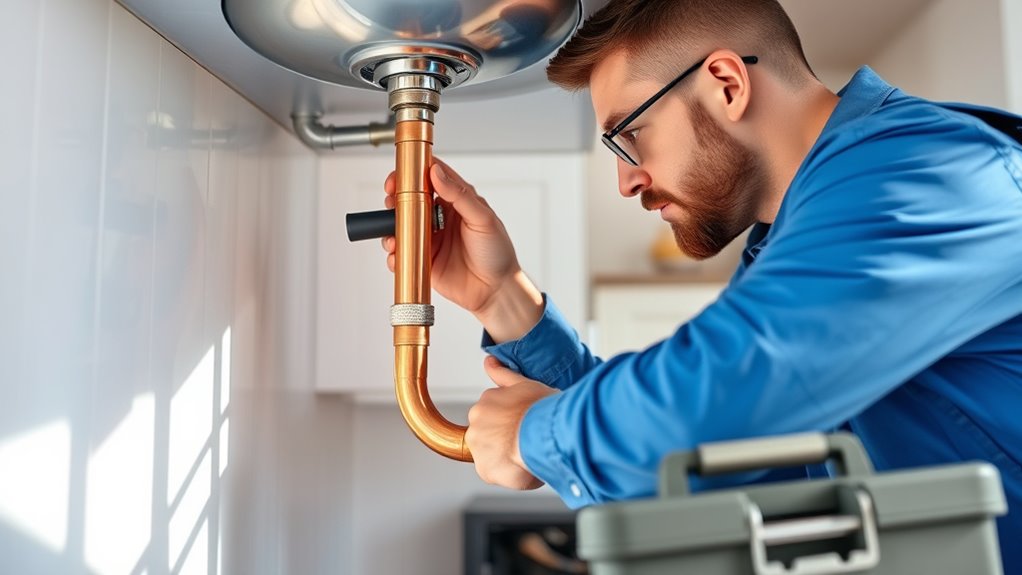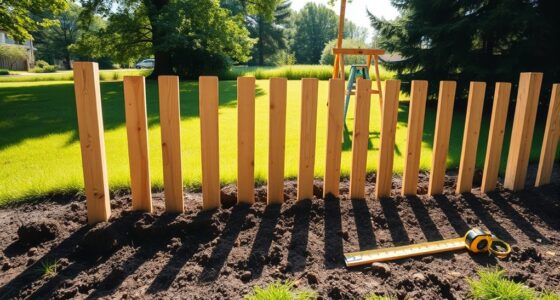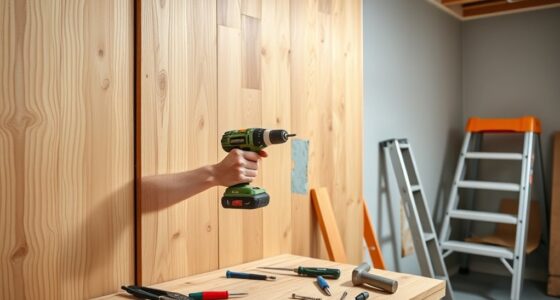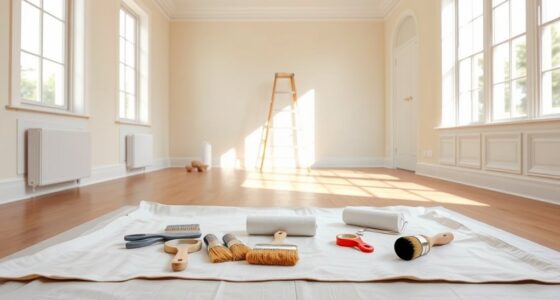To properly maintain your home’s plumbing system, regularly inspect faucets, joints, and pipes for leaks, and fix issues promptly. Keep drains clear by avoiding grease and debris, and use baking soda and vinegar to prevent buildup. Insulate exposed pipes to prevent freezing and conserve energy. Check water pressure and flush your water heater annually to remove sediment. Staying on top of these tasks can save you time and money—discover more tips to keep everything flowing smoothly.
Key Takeaways
- Insulate exposed pipes to prevent freezing and improve energy efficiency.
- Regularly clean drains using baking soda and vinegar to prevent clogs and odors.
- Check for leaks and monitor water pressure to avoid damage and water waste.
- Flush your water heater annually and inspect for corrosion or leaks.
- Address plumbing issues promptly and perform routine inspections for optimal system performance.
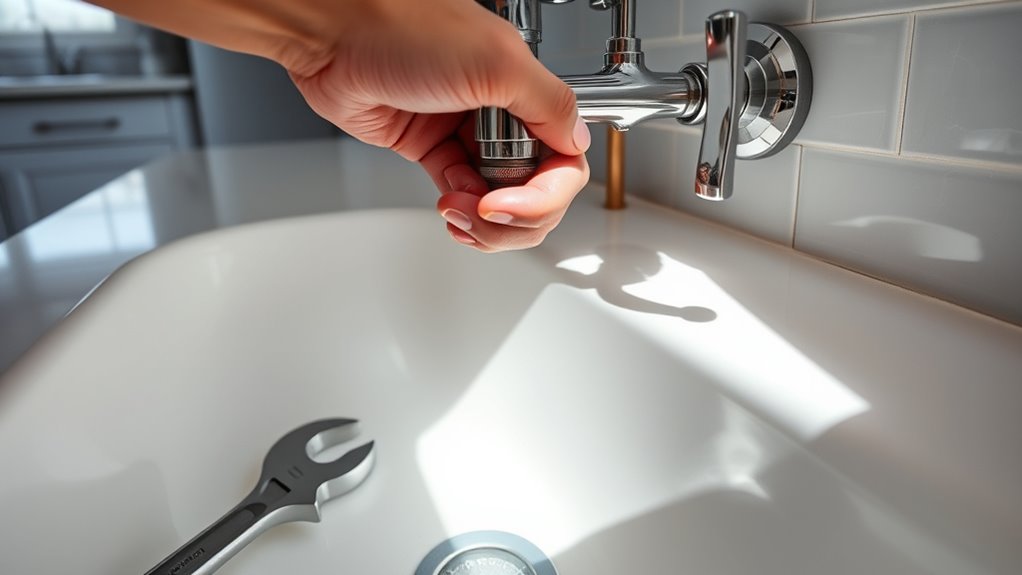
Regularly maintaining your home’s plumbing system is essential to prevent costly repairs and guarantee everything runs smoothly. One of the simplest ways to do this is by paying attention to pipe insulation. Proper insulation around your pipes helps prevent them from freezing in the winter, which can lead to burst pipes and flooding. If you notice exposed pipes in unheated areas like the basement or garage, consider adding foam or fiberglass pipe insulation. This not only keeps your pipes from freezing but also reduces heat loss, making your plumbing more energy-efficient. Insulating your pipes is a straightforward task that can save you significant money and hassle down the line.
Insulate your pipes to prevent freezing and save energy during winter.
Another critical aspect of plumbing maintenance is drain cleaning. Clogged drains are a common problem that can cause backups, unpleasant odors, and even water damage if left unchecked. To keep your drains flowing freely, avoid pouring grease, food scraps, or harsh chemicals down the drain. Instead, use a mixture of baking soda and vinegar periodically to break down minor buildups. For stubborn clogs, a drain snake or a professional drain cleaning service might be necessary. Regular drain cleaning prevents buildup of debris and soap scum, ensuring your plumbing system remains efficient and reducing the likelihood of emergency repairs.
In addition to insulation and drain cleaning, you should routinely check for leaks around faucets and joints. Small leaks can waste water and cause damage over time. Fix leaks promptly using appropriate tools or call a plumber if needed. Maintaining proper water pressure is also essential; high pressure can stress your pipes and cause leaks or bursts. You can test this with a pressure gauge and adjust your pressure regulator if necessary. Awareness of pinball machine weight and proper handling techniques can also be useful when moving heavy appliances or fixtures in your home.
Furthermore, keep an eye on your water heater. Flushing it annually helps remove sediment buildup, which can impair its efficiency and lifespan. Inspecting for corrosion or leaks around the unit can prevent unexpected failures. It’s also smart to familiarize yourself with the shut-off valves for each fixture so you can quickly stop water flow during emergencies.
Frequently Asked Questions
How Often Should I Schedule Professional Plumbing Inspections?
You’re wondering how often to schedule professional plumbing inspections. Regular plumbing maintenance is key to avoiding costly repairs. Typically, you should have an inspection every 1 to 2 years, especially if your home is older or has ongoing issues. This inspection frequency helps catch problems early and guarantees your system runs smoothly. Don’t wait for leaks or clogs—stay ahead with routine professional inspections to keep your plumbing in top shape.
What Are the Signs of Hidden Plumbing Leaks?
Think of hidden plumbing leaks as silent burglars in your home. Signs include unexpected increases in water bills, musty odors, or mold growth. You might also notice damp spots or warped walls, which are clues for leak detection. Regularly inspecting pipe insulation and listening for running water when faucets are off can help catch leaks early. Stay vigilant to prevent small issues from turning into costly repairs.
Can I Use Chemical Drain Cleaners Safely?
Using chemical drain cleaners can be tempting, but you should be cautious about their safe usage. These products often contain harsh chemicals that might damage your pipes or cause health issues if misused. Always read the labels carefully, follow the instructions precisely, and avoid overusing them. For safer and eco-friendly options, consider mechanical methods like a plunger or a drain snake, which are gentler on your plumbing system.
How Do I Prevent Pipe Corrosion in My Home?
To prevent pipe corrosion, start by ensuring your water pH remains balanced, ideally between 6.5 and 8.5, to reduce acidity or alkalinity that causes corrosion. Use pipe insulation on exposed pipes to protect against temperature fluctuations and moisture buildup. Regularly inspect your plumbing for leaks or corrosion signs, and consider installing a water softener if you have hard water, which helps minimize mineral buildup and prolongs pipe life.
What Emergency Steps Should I Take During a Plumbing Failure?
During a plumbing failure, your first priority is plumbing safety. Shut off the main water supply immediately to prevent flooding and water damage. Next, turn off the electrical power if water is near outlets or appliances. Call emergency services if needed, and keep a fire extinguisher nearby. Prepare an emergency kit with essentials. Staying calm and acting quickly guarantees safety and minimizes damage, making you better prepared for any plumbing emergency.
Conclusion
By staying proactive and regularly inspecting your plumbing, you’ll notice small issues before they become big problems. When you clear out drains, check for leaks, and schedule maintenance, you’ll find that your home runs smoother, saving you time and money. It’s funny how a little effort now often leads to fewer emergencies later. Keep up with routine care, and you’ll enjoy the comfort and peace of mind knowing your plumbing system is always in good shape.

